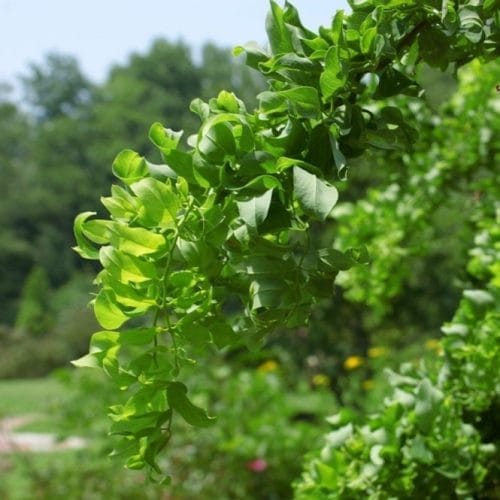-
 'Pendula' is a lovely half standard weeping ornamental pear tree with beautiful grey-green narrow leaves that have a silver downy underside. Pretty single white flowers appear in April-May and they are popular with wildlife. The wonderful silvery-blue foliage turns an attractive bronzed green in the autumn before falling and brown/green ornamental fruits are also produced which are eaten by birds.
'Pendula' is a lovely half standard weeping ornamental pear tree with beautiful grey-green narrow leaves that have a silver downy underside. Pretty single white flowers appear in April-May and they are popular with wildlife. The wonderful silvery-blue foliage turns an attractive bronzed green in the autumn before falling and brown/green ornamental fruits are also produced which are eaten by birds. -
 Black Locust. A slow-growing, half standard deciduous tree. Charming and unusual twisted stems and curly leaves. The foliage emerges a refreshing lime green with multiple pairs of rounded leaflets, transforming into a beautiful buttery yellow in Autumn. This dwarf member of the Black Locust family boasts fragrant white flowers hanging delicately from its curled branches in summer.
Black Locust. A slow-growing, half standard deciduous tree. Charming and unusual twisted stems and curly leaves. The foliage emerges a refreshing lime green with multiple pairs of rounded leaflets, transforming into a beautiful buttery yellow in Autumn. This dwarf member of the Black Locust family boasts fragrant white flowers hanging delicately from its curled branches in summer. -
 Ornamental Cherry. Deciduous half standard tree. Pale pink, fragrant flowers appear in spring, after the young leaves have appeared. The colourful foliage is red whilst young, turning a more intense red-purple through the summer months and becoming more bronzed in autumn. Occasionally a few cherry sized, blackish-purple fruits are produced in July.
Ornamental Cherry. Deciduous half standard tree. Pale pink, fragrant flowers appear in spring, after the young leaves have appeared. The colourful foliage is red whilst young, turning a more intense red-purple through the summer months and becoming more bronzed in autumn. Occasionally a few cherry sized, blackish-purple fruits are produced in July. -
 Cercis ‘Merlot’ is a graceful new introduction of weeping habit. Deciduous tree. Leaves are heart-shaped, deep red-purple turning green in summer and shades of orange, bronze and red-purple in Autumn. A good display of deep-pink flowers appear in clusters on bare stems before the leaves in Spring. Perfect for small gardens.
Cercis ‘Merlot’ is a graceful new introduction of weeping habit. Deciduous tree. Leaves are heart-shaped, deep red-purple turning green in summer and shades of orange, bronze and red-purple in Autumn. A good display of deep-pink flowers appear in clusters on bare stems before the leaves in Spring. Perfect for small gardens.











